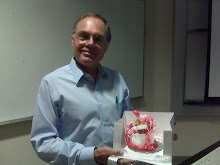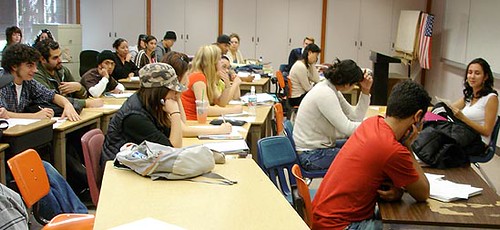California Decision Backs Online Free Speech
 Here are some of the early arrivals at the Getty Center last week. We had 64 MC101s and guests, a fine turnout considering the weather (a bit dreary) and the timing of the field trip (the day before Thanksgiving).
Here are some of the early arrivals at the Getty Center last week. We had 64 MC101s and guests, a fine turnout considering the weather (a bit dreary) and the timing of the field trip (the day before Thanksgiving).Can you lose a libel suit for placing someone else's libelous message on the Internet? No, according to the California Supreme Court in a decision that is being hailed by those in favor of online free expression but is causing ripples of worry across traditional newsgathering organizations.
The decision sets up a two-tiered structure that gives websites considerably more protection from libel suits than newspapers, magazines, radio, television and other non-online media have traditionally had. This means that printing a libelous letter to the editor can still get a print newspaper sued, but running the same letter on the newspaper's website would not put the newspaper at risk for a libel suit.
Despite this decision, the author or authors of defamatory messages can still be sued for libel no matter where--online or offline--their messages appear.
This medianote fit in nicely with our discussion of the media Law segment of the course. Our discussion was based on this Los Angeles Times article.
***GABCAST JAMMED For some reason. Gabcast is not letting me make an audio post. Hoppefully, it will be corrected soon.
***GABCAST UNJAMMED I was finally able to get through to Gabcast and make the audio post on Thursday afternoon.
Gabcast! Club MediaNote #8


 OJ Simpson's NFL rookie card, 1970.
OJ Simpson's NFL rookie card, 1970. Here are some of the college and university recruitment materials that Glendale College students were tempted with at Transfer Day.
Here are some of the college and university recruitment materials that Glendale College students were tempted with at Transfer Day. Meet your new economics teachers.
Meet your new economics teachers. This graphic is from a net addiction page at Stanford University.
This graphic is from a net addiction page at Stanford University. Here is a sampling of the political direct mail pieces that have been sent to me recently.
Here is a sampling of the political direct mail pieces that have been sent to me recently. Alana Stoneking puts a group of MC101s through their paces during a noontime review of material in the first half of Mass Comm 101. Midterm is coming up soon.
Alana Stoneking puts a group of MC101s through their paces during a noontime review of material in the first half of Mass Comm 101. Midterm is coming up soon.